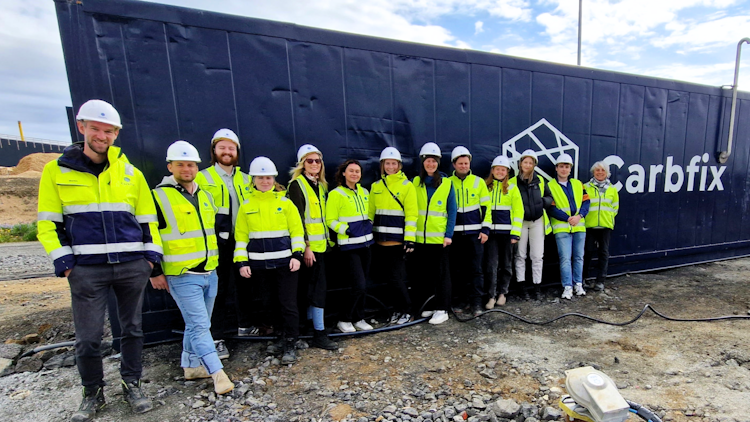🇮🇸 Carbfix: Wells completed for first-ever field tests of mineralizing CO2 using seawater
Press release from Carbfix

Baseline measurement campaign started and mobile injection system in place
Carbfix has recently finished the drilling of all wells needed to start the first-ever field tests of using seawater to mineralize CO2 underground. A new mobile injection system, the first of its kind, is also in place, and baseline geological tests, led by scientists from ETH Zurich, have commenced. The test injections will commence at Helguvík, Iceland, later this summer.
Increased potential of Carbfix’s technology
If successful, the approach of replacing freshwater with seawater to transport CO2 into the subsurface will significantly increase the world-wide potential of Carbfix’s technology. It has already been shown, in laboratory tests conducted by the University of Iceland and Carbfix, that seawater can be used for the purpose of CO2 mineralization with the Carbfix technology. Now this will be tested in the field for the first time.

Increased potential of Carbfix’s technology
If successful, the approach of replacing freshwater with seawater to transport CO2 into the subsurface will significantly increase the world-wide potential of Carbfix’s technology. It has already been shown, in laboratory tests conducted by the University of Iceland and Carbfix, that seawater can be used for the purpose of CO2 mineralization with the Carbfix technology. Now this will be tested in the field for the first time.
Extensive collaboration
The project, called CO2SeaStone, is a collaboration between Carbfix and ETH Zurich, the University of Iceland, Iceland GeoSurvey, the universities of Geneva and Lausanne, and University College of London. It is backed by funding from Eurostars, the Icelandic Centre for Research, and the Swiss Federal Offices of Energy and for the Environment. The municipality of Reykjanesbær participates by providing access to the injection site at Helguvík.
CO2SeaStone is part of the wider DemoUpCARMA project, led by ETH Zurich, which focuses on various pathways to demonstrate and scale-up carbon capture, utilization, transport, and storage technologies to generate negative CO2 emissions or avoid emissions from hard-to-abate sectors.

Cross-border carbon capture and storage
Capturing CO2 in Switzerland and transporting it to Iceland for permanent mineralization is one of the pathways being demonstrated by DemoUpCARMA. Carbfix has already received several containers of CO2 transported from Switzerland and used its established injection site at Hellisheiði, Iceland to mineralize it. Going forward, the CO2 from Switzerland will be used for the seawater tests in Helguvík, a total of up to 1,000 tons within 12 months.
As far as Carbfix is aware, the Swiss-captured CO2 already stored in Iceland by Carbfix marks the world’s first instance of cross-border transport of CO2 for geological storage. Such transport is expected to increase in the coming years. It will be needed to reach the world’s climate targets, since it will not be possible to store all captured CO2 close to its source. The CO2SeaStone project will test various aspects of this approach, including regulatory issues and the carbon footprint.

Extensive measurement campaign started
The wells drilled by Carbfix for the tests include an injection well, a seawater supply well, and three monitoring wells for various methods of monitoring.
Scientists from ETH Zurich will oversee geophysical monitoring of the CO2 injection. This marks the first time that geophysical methods are used to confirm CO2 mineralization. The methods include seismic monitoring to measure changes in seismic velocity of the subsurface, as well as ground penetrating radar measurements to further characterize the subsurface before and after injection of CO2. Baseline monitoring has already started and post-injection changes to the results should reflect the mineralization.
Carbfix will oversee the injection of CO2 into the basaltic subsurface, and monitor the fate of the injected CO2 using already established geochemical monitoring methods.
About Carbfix:
Carbfix is the world’s first CO2 mineral storage operator. Since 2012, Carbfix has mineralized over 90 thousand tons of CO2 in Iceland using proprietary technology. This proven, safe, permanent, and cost-effective carbon storage solution is ripe for significant upscaling both in Iceland and worldwide. Carbfix’s largest current project is Coda Terminal, recipient of a EUR 115M grant from the EU’s Innovation Fund, with an expected capacity to mineralize 3 million tons of CO2 annually. For more information, please visit www.carbfix.com
Media Contact
Ólafur Teitur Guðnason, Head of Communications and External Relations
+354 8563535
The digital emissions from this story are an estimated 0.2g to 1,0g CO₂ per pageview.
Originally published on 20 June.